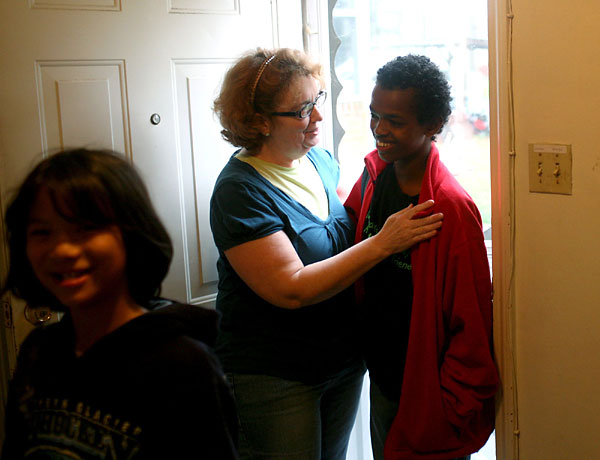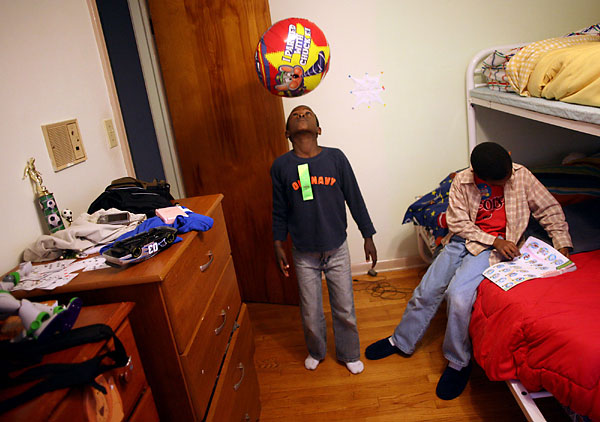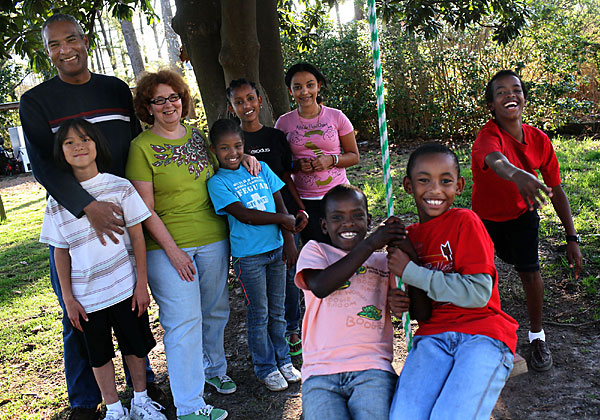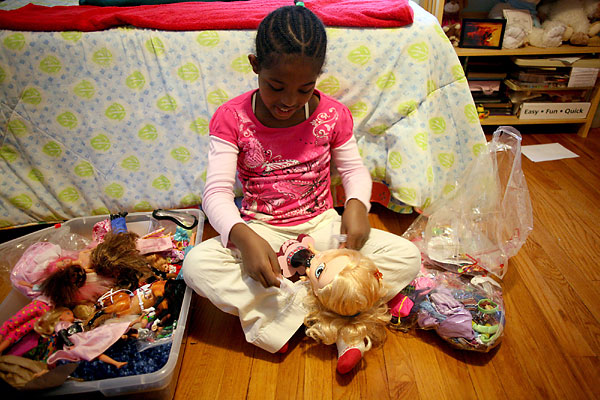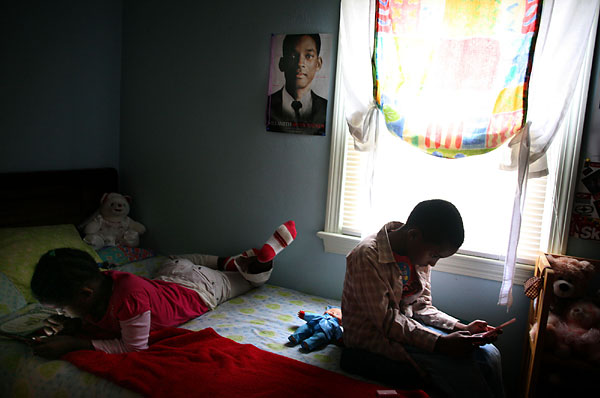CHESAPEAKE
The children’s mother was supposed to be dead, or at least on her deathbed.
Pam and Juan Johnson had traveled more than 7,000 miles to Ethiopia to adopt her three children, to give them new parents and a new family.
Yet the couple was in Addis Ababa, staring at a recent picture of their new children’s mother. She didn’t look sick; she looked young and healthy.
The adoption had already gone through. The Johnsons were free to take the children home to the United States.
“We’re sitting, looking at each other,” Pam Johnson said. “What do you do?”
The Chesapeake couple knows they’re not the first people to run into problems with Ethiopian adoptions – the country is the second most-popular foreign destination for adoptive American families, behind China.
International adoption can be a murky world. Periodically, the State Department will issue warnings about adopting from certain countries – Nepal and Guatemala were recently put on the list. While Ethiopia is not, the licenses of several Ethiopian orphanages were recently revoked, and the U.S. Embassy there just put in place stricter visa processing requirements.
Some Americans who have adopted from Ethiopia say they’ve been given the wrong baby. Some mothers expecting healthy children have wound up with very ill ones.
Still – a healthy mother giving away her healthy children was something the Johnsons weren’t prepared for.
Justin, Zoë and Davis were the Johnsons’ third set of adoptions. They adopted three siblings from Ethiopia in 2006 and a boy from China in 2002 . The new additions also were siblings, ages 11, 8 and 7 at the time. It was May 2009.
The Johnsons had been sitting in the courtyard of the halfway house, where children go from the orphanage to wait for their new parents to arrive. They were signing papers when a worker, flipping through the children’s files, came across a picture.
Who’s that? Juan asked.
Their mother, Pam remembers the worker saying casually . Justin jumped up and pointed out his mom, along with several other relatives in the picture. The Johnsons asked for a copy , as their hearts sank. They still keep two copies in their files, with each relative labeled in pen on the back.
Once back home, Leah, the Johnsons’ oldest adopted daughter from Ethiopia, would sometimes mention strange things Justin had said to her in Amharic , their native language. He’d talk about being able to go back to Ethiopia any time, and say that he was just in America for school.
“Oh, he couldn’t think that,” Pam would tell her.
“Well, mom, that’s what he said,” Leah would reply. Then, shortly after Christmas, they were sitting around the dining table when Justin mentioned he thought he’d be going home for the holiday. He asked to call his mother.
Pam remembers him saying: “ Mom wanted me to call . We haven’t talked to my mom. ”
Pam shooed the other children out of the room, as Justin told her about his concept of adoption. He was coming to America only for school, to get a good job, he said. He would be able to see his mother on vacations, and talk to her regularly. There was no mention of having new parents, joining a new family. Soon both of them were crying.
He went up to his room and lay on his bed, sobbing, while Pam sat with him, not knowing what to say.
All those times he’d been talking to Leah, “we’d thought he just didn’t understand,” she said. “But in reality, we didn’t understand.”
The Johnsons’ Dominion Lakes home feels like a busy and happy place. On Fridays after school, when there’s no soccer practice, seven children romp around the backyard on skateboards and bikes, sometimes so loudly that it draws over other children to investigate.
Joey, 10, practices his skateboard tricks on a plastic ramp. He was a tiny, 24-pound 3- year-old from Hunan Province in China who could barely walk when his parents adopted him. Now, he comes home bragging about how many push-ups he did that day.
Jaden, 8, can be found in a massive tree in the back yard, with Zoë, now 9, scampering up after him.
Davis, now 8, and Justin, now 12, might be playing soccer with other kids from the neighborhood, while the two oldest girls, Leah, 17, and Analyse, 15, chat on the phone, or take a walk.
Pam and Juan say they’re still very pro-adoption. Joey, for instance, is a happy kid. They do feel a little uneasy about their first Ethiopian adoption, when they got Leah, Analyse and Jaden. They said they were told the children were very poor, were headed for lives in prostitution and that they ate only one meal a day.
Turns out, none of that was true, the children would later tell them. Their parents were dead, but they had wealthy relatives who could have cared for them. But the girls and their brother have happily settled in with their new family.
Even with their third set, it’s not so much Zoë and Davis that the Johnsons are worried about – at 9 and 8, they seem young enough to take this in stride.
But Justin …
The issues in his adoption have made them question his littlest gestures.
Is he just naturally shy? Or is his shyness a sign he can’t bond with his new family? Are his downcast eyes just how he’s used to interacting with adults? Or do they indicate an unhappiness his limited English can’t give voice to?
And they can’t stop worrying: What does his mother know?
“You feel like unintentional kidnappers,” Juan said.
They’ve put their second set of children into group therapy, which they think has helped them open up . They encourage talk about Ethiopia at dinner. They’re trying to address the issue head-on, they say.
“We don’t want to pretend none of this happened,” Juan said. “But we don’t want any child to feel like we don’t want them, or that they shouldn’t be here.”
“They’re here,” Pam said. “And we will take very, very good care of them.”
A lawyer for the Johnsons’ adoption agency, Curtis Bostic, said it is the Ethiopian government that deems a child an orphan and adoptable – not the adoption agencies – and the agencies have almost no contact with biological parents. The government provides information about the child’s background, he said, which agencies then provide to potential adopters.
When parents adopt through Christian World Adoption, he said, they sign a form at the start that says the information they’re provided about the child that’s going to join their home may not be true.
“We know that sometimes it’s inaccurate. You need to investigate within yourself as to whether you’re willing to continue with an adoption knowing that you may not have” correct information, he said. “If you’re an adoption agency you have to trust that a parent will take this seriously, wouldn’t you think?”
Yes, he says, there is risk in these adoptions. “You either accept the fact that on occasion you’re not going to have entirely accurate information, or you leave children to die in Ethiopia,” he said. “Those are the two choices.” As far as Justin not understanding that he was being adopted, Bostic said he can’t speak to how that would happen – if, indeed, it’s true.
It’s not easy to talk to Justin about his experience. He’s quiet to start with, and can get quieter when the subject of Ethiopia comes up. His English isn’t great yet, and it can be hard to tell how much he understands. Still, he doesn’t seem angry – he seems resigned. He was upset after that first conversation , but after that “I just stopped thinking about it,” he said.
He believes his mother is expecting to hear from him. He knows the number, he said. He could call. But he isn’t planning to.
The Johnsons say they have no intention of contacting her either. They think the worst thing that could happen is that they call her, and she demands her children be sent home right away – what would they do then? There are no procedures for sending a child back to Ethiopia.
You don’t give back your biological children when they’re not what you expected, Pam said. They’re trying to think of this the same way. “No matter what dishonest things were done … these kids are here for a reason,” she said. “I’m going to hold on to that.”
http://hamptonroads.com/2010/04/news-stuns-chesapeake-couple-adopting-ethiopian-kids?cid=mc
